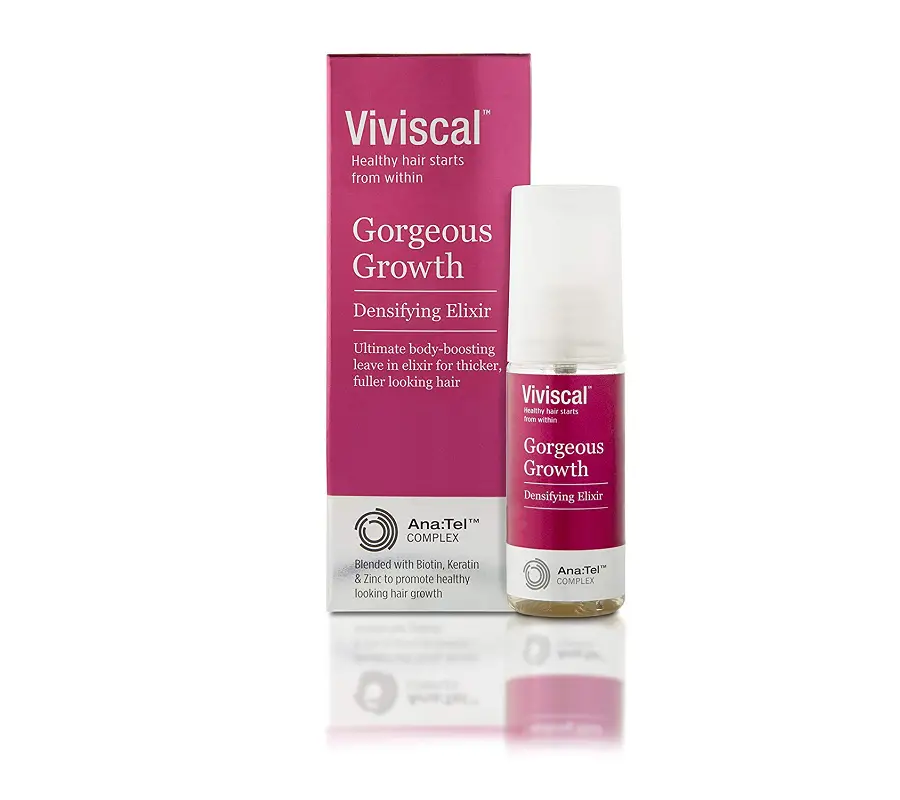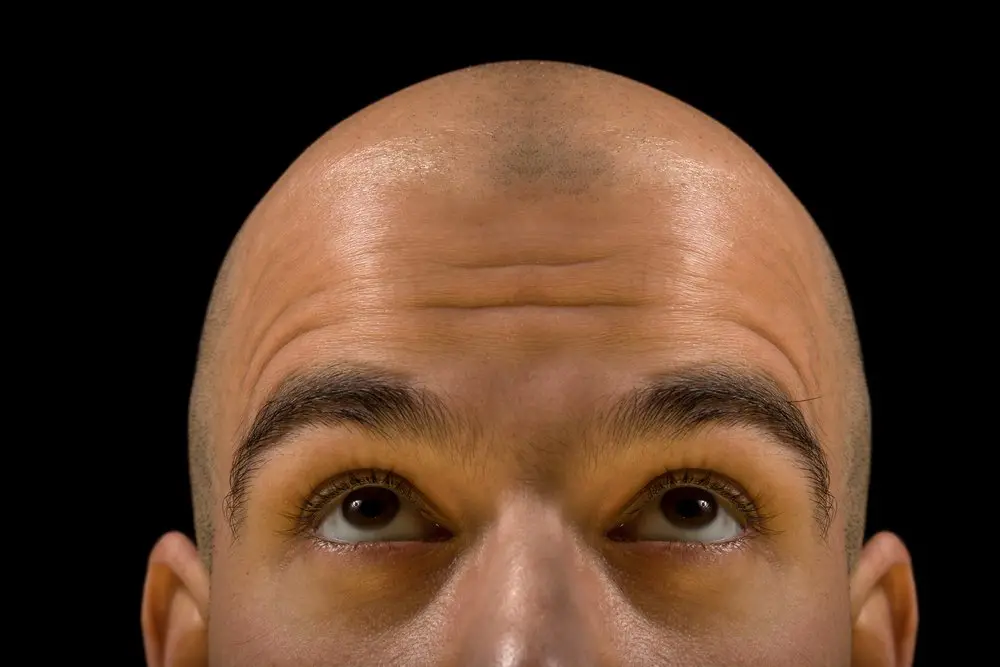![Shea Butter for Hair Growth [The Untold Benefits] Shea Butter for Hair Growth [The Untold Benefits]](https://hairlossgeeks.com/wp-content/uploads/2019/10/shea-butter-for-hair-loss-truth-or-myth-1-768x512.jpg)
Page Contents
If you crave for healthy hair (and who doesn’t), then shea butter should undoubtedly be in your beauty arsenal. This amplified natural ingredient can transform frizzy hair into soft and beautiful hair.
For centuries, traditional African countries have used different parts of the shea tree to produce products for the entire human body. It can also be used for a healthy, natural hair routine from start to finish, including styling.
However, when considering whether or not to use unrefined, raw shea butter for hair growth, you should consider the condition of your hair and what point in the hair care process to use shea.
While shea is generally safe to use for a range of hair conditions and textures, you don’t want to misuse or overuse Shea Butter in the hair for the best results.
Unsure of how shea butter works for hair growth? Here’s everything you should know about shea butter and hair loss.
Best Shea Butter for Hair and Skin
The increase in products with shea butter have been filling the shelves of stores throughout the world. Its popularity is increasing in the hair growth world, but that doesn’t mean it’s the right choice for everyone. While industry trends usually point to signs of success, this is one we’re a bit skeptical of.
First, let’s start with what shea butter is: Shea butter is created when the nuts from a shea (karite) tree are collected, roasted, then pounded into a pulp. This process allows the rich oils from the nuts to be separated, which that fat is then formed into a solid.
But does it help with hair loss? Read on to find out.
What Is Shea Butter?
Shea butter is derived from shea nuts/seeds, also known as karite tree (Vitellaria paradoxa) – and is cultivated in many African countries, such as Burkina Faso, Sudan, Gambia, etc.
It’s rich in beneficial fatty acids such as linoleic, oleic, and stearic acid, as well as vitamins, catechins, and minerals. Shea butter comes in two forms “refined and unrefined,” and it’s the refined form of shea that is made into shea butter.
It has lots of incredible benefits for both the hair and skin and is produced via a laborious process of harvesting, washing, after which the shea nuts are prepared and the oil extracted.
As I mentioned earlier, the shea tree is also called “karite tree” (meaning “tree of life”) due to its numerous healing properties.
Different studies have shown that food, shampoos, skin balms, traditional medicines, soaps, lamps, and cooking oils have been produced with shea butter in Africa for centuries. Its various use was documented in the 14th century.
A study by the National Research Council also shows that “shea butter is equally edible.” Some African communities use it to prepare food, just like the Americans use butter or cooking oil.
Finally, shea butter has also been used as an alternative for cocoa butter while producing chocolate in the European Union.
Is Shea Butter Good For Hair?
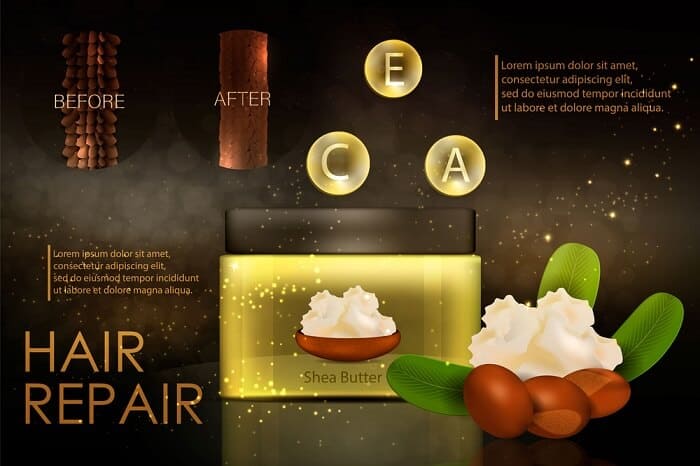
The use of shea butter has become rampant in skincare and hair products across North America.
Shea butter has many soothing qualities that can help calm your scalp, especially if you experience constant dry scalp. In this case, use a little amount of shea butter and massage it into your scalp in a circular motion.
You can equally comb shea butter through your hair pre-shampoo before shampooing and allow it to set in for about an hour if you’re also suffering from dry, dull, or frizzy hair.
What Does Shea Butter Do For Your Hair
Here are some of the things shea butter can do for your hair:
As a moisturizer
Shea butter is rich in Vitamins A and E, essential fatty acids, as well as some necessary ingredients that can help add moisture to your hair, prevent split ends and reduce dryness.
That’s not all; fatty acids can equally help to increase shine and minimize the frizz of your hair. And finally, it may also help protect your hair from heat damage that’s often caused by blow-drying and flat irons.
It prevents breakage
One study carried out to ascertain the role miracle fruit seed oil plays in preventing the hair from breaking. A native West African fruit known as “Synsepalum dulicificum” also produces oil.
Just like shea butter, Synsepalum dulicificum also has a high fatty acid content, making it easy for it to penetrate your hair in oil form – this ultimately helps with hair breakage.
- Read Also: How to Use Saw Palmetto for Hair Growth
It reduces scalp irritation
The anti-inflammatory properties in shea butter might also help reduce scalp irritation and redness by delivering healing effects without clogging the pores.
Furthermore, as a natural product, shea butter is safe to use on every type of hair, even dry, color-treated, or damaged hair.
It’s also worth noting that raw shea butter is not the only available hair care products. Some over-the-counter hair care solutions (conditioners in particular) equally contain shea butter.
The work of conditioners in general hair health includes reducing frizz, lubricating cuticles, and strengthening hair fibers.
How To Use Shea Butter For Hair Growth
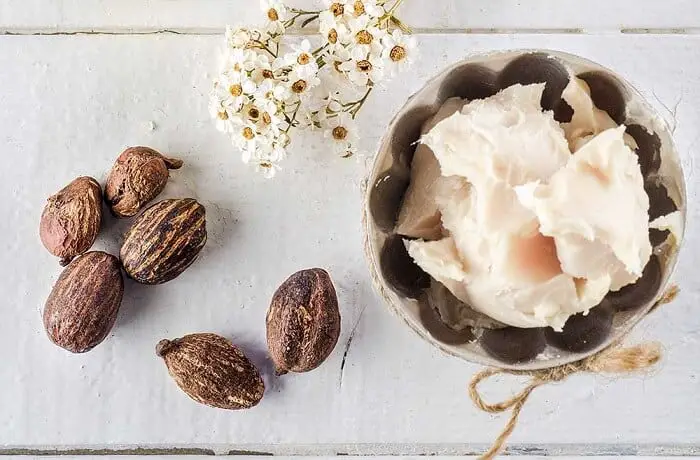
Now, here’s how to use shea butter for hair growth:
1. Softener for hair
Shea butter is a great moisturizer and is excellent for softening hard brittle hair. It offers that advantage for fragile curly as well as dried hair.
The procedure
Mix shea butter with another carrier oil and apply the mixture as your “oil step” as a moisturizer or in the LOC method for second or third-day hair.
2. Sealant for the hair
Black hair tends to be dryer than any type of hair because of the texture. Due to the coils or bends of black hair, the natural sebum from the scalp finds it daunting to slide down the shaft to the ends.
Because of its emolliating qualities, shea butter is often found in curly hair treatments. This makes it perfect for fastening moisture without leaving your hair heavy and greasy.
Since it helps in locking in moisture into the hair, it’s also terrific for protecting your hair against the weather.
The procedure
You can use shea butter alone, or you include it in your favorite conditioner to provide you extra moisture. It’s equally an excellent additive for hair creams and shampoos.
3. Calm irritated scalp
Shea butter has also been used for thousands of years to calm dry dandruff or itchy scalp on African Hair. It’s equally a fantastic source to supply moisture to damaged or dry hair.
It is usually used as a foundation for health-related hair creams, and it is believed to have anti-inflammatory qualities. Shea butter quickly absorbs into the scalp without clogging the pores.
It supplies moisture from the roots down to the ends, which made it incredibly beneficial to heat-treated, relaxed, or colored hair.
The procedure
Melt shea butter in a double boiler over boiling water. When it has cooled to a proper temperature, spread it onto your fingertips and apply a little amount of it directly onto your scalp.
Then rub it in a circular motion – you can also add a few drops of tea tree oil for a more soothing sensation.
4. Protects the hair against UVS
Shea butter also has a little, but sufficient amount of sun protection factor (SPF), which helps to protect the hair against the damage from ultraviolet rays (UV) of the sun. This is beneficial for color-treated or processed hair.
The procedure
Melt shea butter and lightly apply it before going to the lake, beach, or any activity that will expose your hair to sunlight. It can even be added to your moisturizer spray.
5. Protects against Heat
The shea butter oil does not just sit on the hair, but it absorbs into the hair shaft/strand without leaving a heavy or greasy feel.
However, it coats the hair strand to offer protection against the damage that comes from the heat tool being passed along the hair.
The procedure
You can melt it properly and mix it with another natural oil, such as avocado oil, or grapeseed oil that have high smoke points. Apply a small amount of it before straightening and blow drying natural hair.
Refined Vs. Unrefined Shea Butter
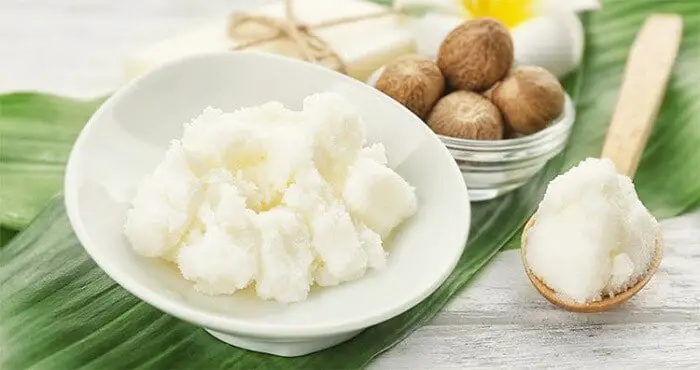
As I mentioned earlier, Shea Butter comes in two types “refined and unrefined.” By unrefined (also known as raw Shea butter), it means that it still has more of its natural ingredients and qualities.
The primary reason why Shea butter is usually refined is to get rid of its natural odor, which may be a turn-off for some people – but the smell does absorb rather quickly.
If you choose to use an unrefined Shea butter with less of a smell, it’s advisable to use Shea Butter that comes from East Africa or Uganda.
- Read Also: How to Cover Bald Head With Makeup
It’s a little more expensive, but it is equally known for having the ability to make your hair slightly softer, and it’s a bit better at moisturizing.
What You Should Know Before Using Shea Butter
You can use shea butter as frequently as you want.
That said, here are some other essential things to know before using shea butter:
The product quality
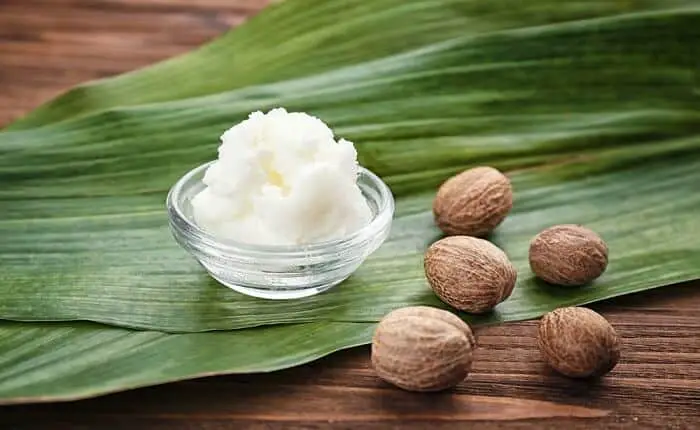
Unrefined, raw shea butter is the highest quality of shea butter. You may not notice as many benefits that come with it if you use a different kind.
So you want to ensure you’re buying a quality shea butter while making your purchase.
The aroma
Pure shea butter has an intense, somewhat nutty odor that some people might not be comfortable with.
However, adding essential oils to it can change the aroma and add extra benefits.
How to store shea butter
Shea butter should melt into your hand at room temperature and be absorbed quickly into the scalp or skin. Ensure to store it at a consistent temperature as exposure to different temperatures can cause the texture to change.
Aside from that, you also want to keep your shea butter in places that are not affected by heat. This is because if it gets too warm, it will instantly melt and return to liquid form.
On the other hand, if you keep shea butter in a location with very low a temperature, it will become hardened and be hard to use.
How shea butter effects different hair textures
Butters and oils can have a negative impact on your hair, by weighing it down, especially if you have thin hair.
And if you have oily skin, then applying excess oil in your hair is also not suitable, as this can put even more oil on your shoulders, face, and back, resulting in breakouts.
- Read Also: Sesame Seed Oil Benefits for Hair
Because shea products come in both butter and oil form, you should know your individual hair needs before making a purchase:
- In case of looser hair texture, applying a little portion of shea oil may be more beneficial
- If you have oily or thin hair, shea butter can be heavy and also make hair greasier or flat
Using Shea Butter for Natural Hair
Watch the short video below to learn how to use shea butter for natural hair:
Where Can You Buy Shea Butter?
As a popular moisturizing product for the hair, most beauty supply shops that cater to black hair should have both refined and unrefined Shea Butter.
Aside from that, you can also buy it from online retail stores such as Amazon. Check the links above.
Frequently Asked Questions about Shea Butter
Is shea butter good for 4c type hair?
Yes, shea butter is good for 4c hair, particularly Unrefined Shea Butter.
Can shea butter be used as a leave-in conditioner?
Shea butter is generally used as a leave-in conditioner for wild, dry, and frizzy hair.
Can I leave shea butter in the hair overnight?
Yes! You can add the prepared Shea butter to your favorite conditioner, then massage onto wet, clean hair. Let it stay on your hair overnight and then wash off in the morning.
This way, you will be able to keep your hair in good condition naturally.
Is shea butter useful for damaged hair?
Shea butter is not just good; it’s actually excellent for damaged hair. It nourishes the scalp, moisturizes the hair, and repairs damaged hair. Overall, it makes the hair healthier, stronger, and shinier!
Does shea butter soften hair?
Shea butter, when used often and continuously, helps to improve the feel and texture of the hair.
The essential fatty acids present in shea butter penetrates deeply into the hair shaft to soften the hair strands and smooth the cuticles, thereby giving the hair a soft and silky feel.
Does shea butter help split ends?
Shea butter equally contains antioxidants like vitamin E that protects the hair, adding an extra layer of care and protection to ends in danger of splitting.
Does shea butter expire?
The shelf life of unrefined shea butter is around two-years from the manufacture and packaging date.
How Shea Butter Can Help Hair Growth
Let’s start with the positives that come along with using shea butter. Studies have proven that there are anti-inflammatory properties in shea butter. When you reduce the inflammation on the scalp, you provide a much more suitable environment for hair to grow.
She butter is also filled with nutrients like vitamins A, E, F, and K, which can also help support a healthy scalp and provide nourishment to your locks.
Another great benefit to shea butter is that it is an emollient, which improves the flexibility of the skin and helps soothe irritation.
Side Effects of Using Shea Butter
Now for the bad. Like all products on the market, there is generally pros and cons of each. With shea butter, overuse can easily dry out your hair. You’re likely thinking “but it’s an oil and should just moisturize my locks,” and unfortunately that impression is wrong. Shea butter is also a very heavy oil. It can suffocate your hair and scalp, which can quickly dry out your hair, which will leave you with additional problems that can cause increased hair loss. If you are unable to clarify the layer of oil off your hair and allow water to moisturize your cuticle, your hair will begin to become dry and brittle.
Because most people overuse shea butter in hair applications, you can see a build-up of the oil in your hair. Sulfate-free shampoos are not strong enough to remove the oil buildup from shea butter, so you’ll never be able to fully clarify your hair (again, results in dry hair). There are many other oils that are water-soluble (or easy to remove with a light cleanser), which will better serve your hair loss needs.
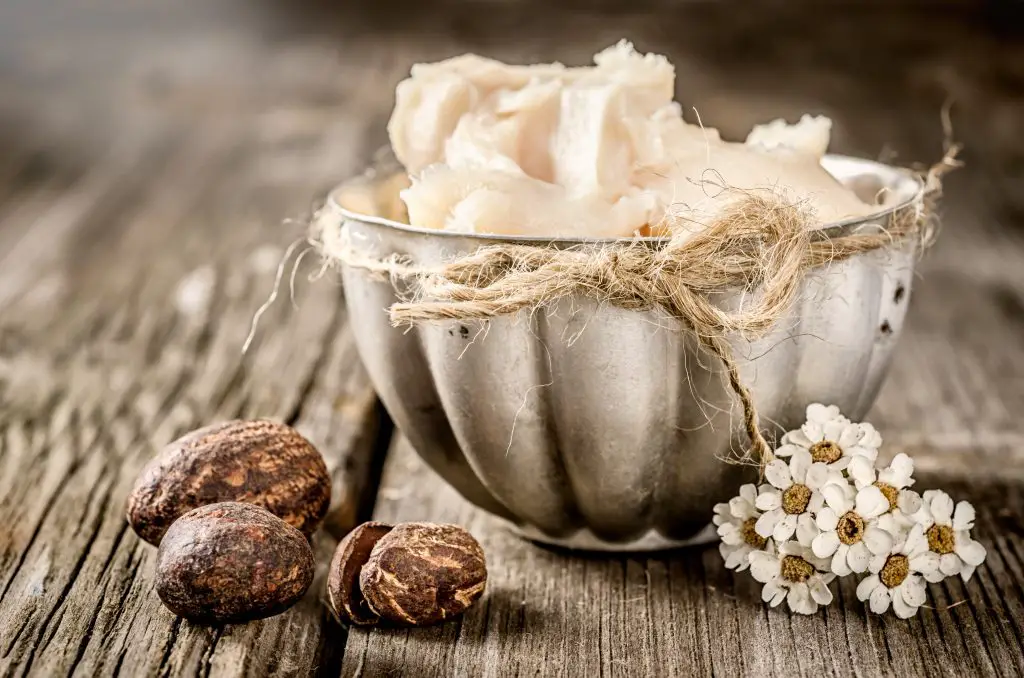
The Bottom Line
Even though shea butter is a popular product in the cosmetic industry, the mixed reviews on it don’t make it an ideal product for hair loss. This is one that we’d walk away from. With numerous other natural options like honey, rosemary oil, and aloe vera, there are so many other ways you can boost hair growth instead of this product. Our take, shea butter for hair loss is more on the myth side of the spectrum.
So, if you are going to add shea butter to your hair care routine, use caution and watch for signs of your hair drying out.
Conclusion
However, before using shea butter for hair growth, ensure you don’t have a hair texture that’s liable to buildup and grease as shea butter could potentially worsen it. And if shea butter becomes too heavy, shea oil is a fantastic alternative.
Remember that everyone’s skin is different, so you want to perform a patch test on your skin before applying the product all over your scalp. This way, you’ll see how your scalp and skin react to Shea butter first.
Tired of chasing down hair growth solutions without the results you’re after? Make sure you’re using the 3 hair loss products known to work before experimenting with alternative solutions – you may be surprised with how effective those 3 alone can be.








